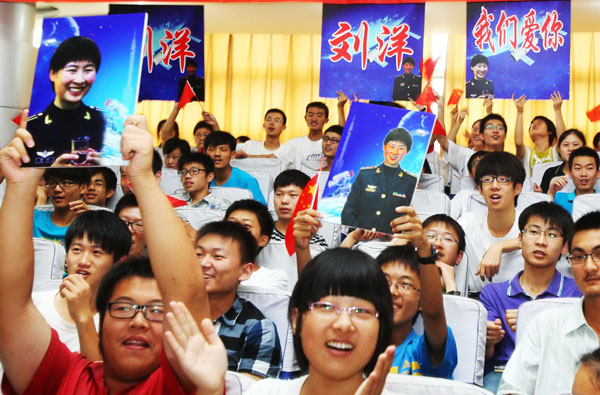
Woman may be on next year's manned mission, Xin Dingding and Wang Qian report.
The grasslands of Inner Mongolia can by no means be called big when compared with outer space.
But they surely are when compared with the tiny capsule holding China's three astronauts, including its first female one, which returned to Earth on Friday morning.
 |
|
The return capsule of the Shenzhou IX spacecraft touched down in the landing area in the Inner Mongolia autonomous region at 10:03 am on Friday. Photos by Wu Yunsheng / for China Daily |
 |
|
Astronauts (from left to right) Liu Wang, Jing Haipeng and Liu Yang enjoy the Earth's atmosphere after leaving the Shenzhou IX capsule on Friday. Photo by Wu Yunsheng / for China Daily |
 |
|
Students of Zhengzhou No 11 Middle School hold pictures of Liu Yang, China's first female astronaut, to celebrate the return of the Shenzhou IX capsule, in Zhengzhou, Henan province, on Friday. Liu graduated from the school 15 years ago. Photos by Wu Yunsheng / for China Daily |
The return capsule of the Shenzhou IX mission landed in North China's Inner Mongolia autonomous region at 10:03 am as planned.
On the vast grasslands, as the astronauts were removed from the capsule to have their first earthly breath in nearly two weeks, China's first manned space docking mission was declared a success.
"The result is satisfactory, the process is perfect, and the mission will bear fruit," Wang Zhaoyao, director of China Manned Space Agency, said at a news conference on Friday.
Jing Haipeng, commander of the Shenzhou IX crew, was the first to come out of the capsule, followed by Liu Wang and woman astronaut Liu Yang.
Sitting in chairs, they were carried into ambulance helicopters where they underwent physical examinations and had their first meal in eight hours. They arrived in Beijing in the afternoon.
Over the past 13 days, they have conducted an automatic docking and a manual space docking between Shenzhou IX and the orbiting Tiangong-1 space lab module.
They also conducted a string of scientific experiments that will help understand how to better protect astronauts’ health in long-duration missions.
Premier Wen Jiabao congratulated the astronauts, aerospace scientists and all working staff in a message on behalf of the central government at the Beijing Aerospace Control Center.
"The rendezvous and docking ... marks a significant breakthrough in China's space docking technology. It also marks decisive progress in fulfilling the second strategic target of China’s manned space program," he said.
According to the plan, the program’s second strategic target includes mastering three basic technologies of manned spaceflight and building a space lab that is manned for a short term. Realization of the target will lay the groundwork for building a space station around 2020.
Wang said that through the past 10 missions, which have cost nearly 39 billion yuan ($6.13 billion), China has mastered the three basic technologies of manned spaceflight — the technology to transport human beings between space and Earth, extravehicular activity technology, and space rendezvous and docking technology.
"In the following missions of building a space lab and a space station, we are willing to carry out technical cooperation with other countries and regions," he said.
Opportunities for cooperation include jointly designing the space lab and the space station, and developing relevant equipment, he said.
Cooperation in space is also welcomed, he said, adding that other countries are welcome to carry out joint experiments aboard the country's future space station.
There are also possibilities of exchanges and cooperation in astronaut selection and training, joint flights and space medical research, he said.
"China's manned space program is open and transparent," he said.
"We will respond positively to the initiatives of the United Nations Office for Outer Space Affairs, and share with other countries our technological achievements and application results," he said.
China started its manned space program in 1992. Since then, nine spacecraft and one space lab module have been launched.
Including the Shenzhou IX mission, a total of four flights were manned, and eight astronauts have traveled to space.
Next year, China will launch another spacecraft, Shenzhou X, to dock with Tiangong-1 to repeatedly test the space docking technology, Wu Ping, spokeswoman for the manned space program, said on Sunday.
Chen Shanguang, director of the Astronaut Center of China, said on Friday that the crew of Shenzhou X is likely to include a female astronaut, too.
"Though it still awaits a decision by the program commanders ... I believe that as the manned space program moves on, more and more women will join in the mission," he said.
Contact the writers at xindingding@chinadaily.com.cn and wangqian@chinadaily.com.cn







